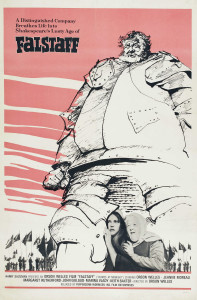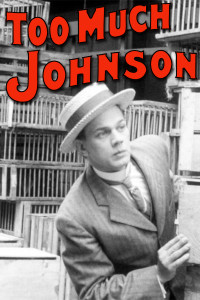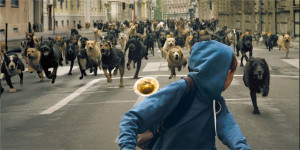
Festival Buzz: Part Two of Three
The Big Auteurs: International Cinema and Restorations
2015 Wisconsin Film Festival, April 9-16; Film Guide at wifilmfest.org»
Film Guide available in Wednesday’s Capital Times (Wisconsin State Journal insert and free distribution sites)
Box Office Opens Saturday, March 14 at 12:00pm: Union South Box Office (Noon-8:00pm); Memorial Union Campus Arts Box Office (Noon-5:30pm); and 2015.wifilmfest.org
Madison Film Forum coverage of the 2015 Wisconsin Film Festival continues with the second of our “Big Three” breakdowns of the festival schedule. Click the Wednesday link below, “The Big Indies,” for our first installment, and look for our third installment tomorrow.
Wednesday: The Big Indies: Narrative Features and Experimental Films
Friday: The Big Docs: Non-Fiction Features and Shorts
As my colleague Jim mentioned in yesterday’s post, I too find this year’s festival to be a little more estoeric than past years. This is a good thing, in that it exposes casual filmgoers to films they otherwise wouldn’t be, whilst giving hardcore cinephiles a little more to sink their teeth into. This is reflected in what used to be known as “Restorations and Revivals,” which is now called “Restorations and Rediscoveries.” This seems apt, as many of the restorations should be very much discoveries indeed for a number of the audience members (myself among them). Before I get to those—including a wealth of Orson Welles material—let’s first look at some of the more recent international selections the festival has to offer.
High Praise Abroad
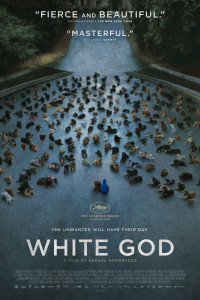 White God | Kornél Mundruczó | Hungary | 2014 | 119 min»
White God | Kornél Mundruczó | Hungary | 2014 | 119 min»
Not to be confused with White Dog, though one may be reminded of the Fuller film as you watch the new one. The films brought from abroad usually carry high critical acclaim, and this one is certainly no different. Awarded the Prix un certain regard at the 2014 Cannes Film Festival, director Kornél Mundruczó’s sixth film tells the story of a girl, her father, and her dog. The girl and her dog are practically joined at the hip, until her father decides to abandon him. While the girl searches for the dog, as you might see from the image above or the poster to the left, the dog makes a few friends along the way. And when I say a few friends, I mean an army. However stylistically beautiful this film may be, the fact that one critic said that it features “the Al Pacino of dog actors,” is more than enough to get me there.
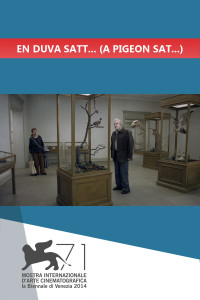 A Pigeon Sat on a Branch Reflecting on Existence | Roy Andersson | Sweden | 2014 | 101 min»
A Pigeon Sat on a Branch Reflecting on Existence | Roy Andersson | Sweden | 2014 | 101 min»
Terrence Malick took a 20-year break from filmmaking between Days of Heaven and The Thin Red Line. Roy Andersson, once called “a slapstick Ingmar Bergman,” took a full quarter-century between the disappointing Giliap and the critical success of Songs from the Second Floor, which played at the 2002 Wisconsin Film Festival. Besides my penchant for titles that are themselves complete sentences, the title alone seems to promise the kind of dry, absurdist humor that characterizes his other films. The story deals with two traveling novelty item salesman, and I can think of few better character types to truck in that kind of humor. Much like White God, this film also comes to our local screens with a prestigious award in tow: the Golden Lion from the Venice International Film Festival.
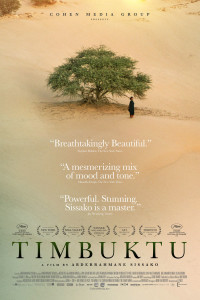 Timbuktu | Abderrahmane Sissako | France, Mauritania, Mali | 2014 | 97 min»
Timbuktu | Abderrahmane Sissako | France, Mauritania, Mali | 2014 | 97 min»
Speaking of high critical praise, much like our forthcoming Madfilm Meetup, Leviathan, Timbuktu was also nominated for Best Foreign Language film at the last Academy Award. Sissako, who has also had other films play at Wisconsin Film Festivals past, tells the story of a peaceful family in Mali whose lives are upended by jihadists. I gravitate toward political films that endure as a result of their portrayal of humanity just as much as their portrayal of politics. A.O. Scott’s description in the New York Times bodes well, then: “And Timbuktu is a political film in the way that The Bicycle Thief or Modern Times is a political film: It feels at once timely and permanent, immediate and essential.”
Restorations and Rediscoveries from Afar
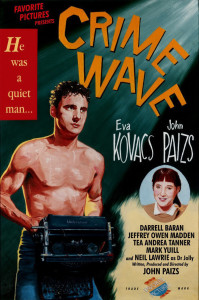 Crime Wave | John Paizs | Canada | 1985 | 80 min»
Crime Wave | John Paizs | Canada | 1985 | 80 min»
Seriously, just look at that poster. Ok, Canada doesn’t exactly qualify as “afar,” but this film will certainly be a discovery for me. While I have either already seen or am familiar with many of the other “Restorations and Rediscoveries,” I confess to knowing nothing about this film except for what the guide has told me. It’s from a director who did some work on The Kids in the Hall, in a film that was an inspiration for Guy Maddin, about a hapless screenwriter who wants to make “the greatest color crime film of all time.” Crime Wave just sounds like it’s going to be one hell of a good time. Seriously, just look at that poster.
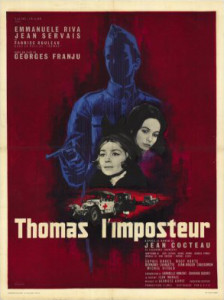 Thomas the Impostor | Georges Franju | France | 1965 | 94 min»
Thomas the Impostor | Georges Franju | France | 1965 | 94 min»
I remember seeing Eyes Without a Face at the 2004 Wisconsin Film Festival in the old Frederic March Play Circle Theater, which was the first Georges Franju film I’d ever seen. Three years after that film came out, he paid tribute to Louis Feuillade with his version of Judex. After that came Thomas the Impostor, with a script by the great Jean Cocteau, based on Cocteau’s own novel. A versatile director and co-founder of the Cinématheque Française, the films I have seen by Franju are always fascinating, and I expect this World War I tale to be no different. While there are a great many well known players in this film (Emmanuelle Riva, Jean Marais, Charles Aznavour), I’m most excited to see Jean Servais as part of the cast. I’ve loved him in everything I’ve seen him in, most especially the heist classic Rififi.
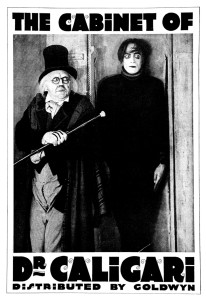 The Cabinet of Dr. Caligari | Robert Wiene | Germany | 1920 | 70 min»
The Cabinet of Dr. Caligari | Robert Wiene | Germany | 1920 | 70 min»
It is one of the seminal horror films. It is THE seminal German expressionist film. You have likely seen it many times, but whether it’s some obscure detail of the production design or an actor’s facial expression that I see in a different light, I always find new and exciting things in The Cabinet of Dr. Caligari. One of the new and exciting things will surely be the score by stalwart pianist David Drazin, who has provided beautiful accompaniment for silent films for UW Cinematheque and the festival over the years. Another will be to see this film with a crowd. My experience with it has invariably been at home, early on for reasons of study. I’m really looking forward to how this might play with a crowd. If you’ve never seen a silent film in the theater before, you owe it to yourself to buy a ticket for this one. You won’t be disappointed.
A Western and Two Noirs
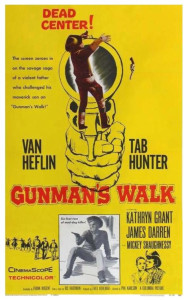 Gunman’s Walk | Phil Karlson | USA | 1958 | 97 min»
Gunman’s Walk | Phil Karlson | USA | 1958 | 97 min»
C’mon, folks. It’s called GUNMAN’S WALK. What more do you need? Seriously, director Phil Karlson is one of the most underrated directors of the 1950s, directing some of the most noir pictures of the decade (5 Against the House, The Brothers Rico, and the unforgettable Kansas City Confidential). I am very excited to see how his sensibilities are going to transfer to a western. In addition to veteran character actor Van Heflin, the film also stars Tab Hunter, who can also be found in two other festival screenings: the John Waters classic Polyester, and the documentary Tab Hunter Confidential.
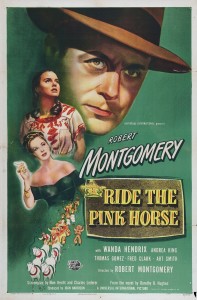 Ride the Pink Horse | Robert Montgomery | USA | 1947 | 101 min»
Ride the Pink Horse | Robert Montgomery | USA | 1947 | 101 min»
Funny that Gunman’s Walk sounds more like a crime title than a western title, and vice versa with this film. Ask people to name the first 1947 Robert Montgomery movie that comes to mind, and it’s probably going to be the “first person” Raymond Chandler adaptation Lady in the Lake. That said, this should be as satisfying—if not more so—to noir fans in attendance at this year’s festival. Co-written by Hollywood screenwriting legend Ben Hecht and based on a novel by Dorothy B. Hughes (In a Lonely Place), this film’s got all the makin’s: blackmail and revenge in a bordertown.
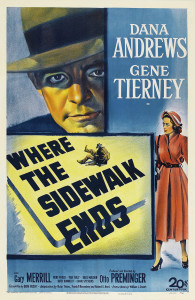 Where the Sidewalk Ends | Otto Preminger | USA | 1950 | 95 min»
Where the Sidewalk Ends | Otto Preminger | USA | 1950 | 95 min»
Laura. Fallen Angel. The Man with the Golden Arm. Advise and Consent. It’s rare to find a Preminger film that I don’t enjoy. Where the Sidewalk Ends is among the very best of Preminger’s work and one of the best noir films period. Also with a script from Ben Hecht, Sidewalk tells the story of what happens when an already troubled cop makes a heinous mistake. In the rush to cover it up, he inadvertently implicates his new lover’s father, and as with any good film noir, the web of lies he weaves slowly begins to unravel. Dana Andrews and Gene Tierney were paired in Preminger’s Laura, and while I prefer Tierney’s performance in that film, Where the Sidewalk Ends may be the best performance of Andrews’ career.
More Wonders from Welles
Chimes at Midnight | Orson Welles | Spain, France, Switzerland | 1965 | 115 min»
Too Much Johnson | Orson Welles | USA | 1938 | 80 min»
As readers of this site are keenly aware, UW Cinematheque provided Madison moviegoers with an outstanding series saluting Orson Welles’ centenary. Being of the mind that one can’t have too much of a good thing, the Festival provides two more vital works in Welles’ oeuvre. With Chimes at Midnight, viewers get more of what they saw in Othello (i.e. Welles’ on-the-run style of filmmaking), albeit with a grander literary scale, as he looks to make a complete portrait of the Shakespearean character Falstaff. It is a hard film to see in a quality print/transfer, and as it is one of my favorite Welles films, my anticipation for this one is substantial. Even more exciting, though, is the chance to see what Orson Welles’ filmmaking was like pre-Citizen Kane. Too Much Johnson was made three years prior to Kane and thought lost for decades, until the footage turned up in Italy two years ago. And if you’re still in want of more Welles after these two programs, be sure to check him out (in dual roles!) in Richard Fleischer’s Crack in the Mirror, and in the documentary Magician: The Astonishing Life and Work of Orson Welles.
As ever, these are but a few of the treasures that await you in this year’s festival. I didn’t cover the Ettore Scola pictures, The Bottom of the Bottle (always count me in for melodrama in Cinemascope), or numerous other films. And while I didn’t mention it here, since Jim covered it in his post yesterday, the other restoration I’m eagerly anticipating is the odorific Polyester. Regardless of the fact that there isn’t necessarily something as grand or well-known as Vertigo or The Good, the Bad and the Ugly, there will be quite a lot to discover and rediscover at this year’s festival.
